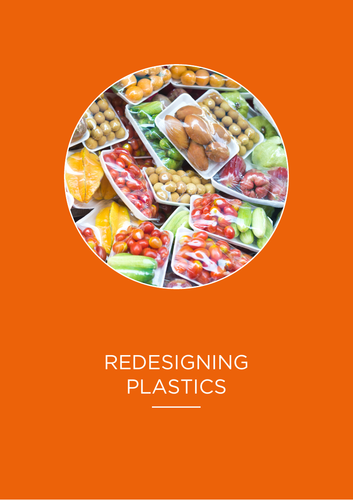

Plastics have become an integral part of modern life, providing many benefits for consumers and producers. But what happens to our waste plastics? Where does it all end up? Is recycling plastics really that effective?
In this lesson, students will explore how we use plastics in everyday packaging and how these might be redesigned in such a way as to not become a ‘waste’ problem. Moving beyond methods to ‘reduce, reuse and recycle’ at the end of life, students will explore ways of designing waste out of the system from the outset. This activity includes
Learning intentions:
To deepen awareness of the systemic challenges around
plastics packaging and how these might be overcome through redesign.
Subjects:
Design and Technology, Biology, Chemistry, Environmental Sciences,
Business
Age range:
12+
Total time:
2x 45 minutes (90 minutes total)
About the Circular Economy
The circular economy is a new way to design, make, and use things within the limits of our planet. In the natural world, materials and nutrients cycle continuously, allowing the Earth’s biosphere to regenerate and for all lifeforms - humans included - to flourish. This insight lies at the heart of the circular economy. Instead of using things for a short time before throwing them away, in a circular economy everything is designed to fit within a cycle so it can be used again and again.
The concept is based on three principles, driven by design, and underpinned by a transition to renewable energy:
1 - Eliminate waste and pollution
2 - Keep products and materials in use
3 - Regenerate natural systems
Using these principles, we can create a system that restores biodiversity, addresses climate change, and makes the most of our planet’s limited resources. Such a system could work for the economy, society, and environment - making it a truly sustainable model for our future prosperity.
About The Ellen MacArthur Foundation
The Ellen MacArthur Foundation, an international charity, develops and promotes the idea of a circular economy in order to tackle some of the biggest challenges of our time, such as plastic pollution, climate change, and biodiversity loss. We work with, and aim to inspire, business, academia, policymakers, and institutions to mobilise systems solutions at scale, globally.
Something went wrong, please try again later.
This resource hasn't been reviewed yet
To ensure quality for our reviews, only customers who have downloaded this resource can review it
Report this resourceto let us know if it violates our terms and conditions.
Our customer service team will review your report and will be in touch.